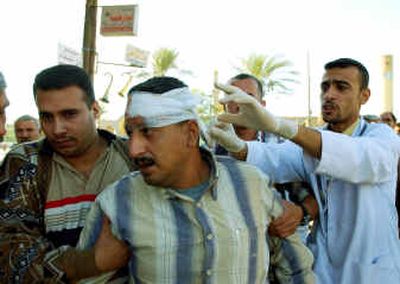Iraqi, U.S. soldiers raid mosque in Baghdad

BAGHDAD – Iraqi troops backed by U.S. soldiers raided the most revered Sunni Muslim mosque in Baghdad, setting off stun grenades, arresting dozens and leaving at least two people dead, according to witnesses and a hospital official.
The raid on the Abu Hanifa mosque just after Friday prayers was the latest in a series of moves targeting religious clerics who support the insurgency, which continues to churn violently in sections of Iraq dominated by the country’s minority Sunni population.
Spokesmen for Iraq’s interim government, which must approve major military operations in the country, tried in recent days to prepare the way for the wave of arrests by citing Iraqi law that equates support for insurgency with the actions themselves. But popular outrage was apparent in the wake of the raid on Abu Hanifa, the burial place of a medieval scholar who founded one of the faith’s most prominent schools of law.
“In the more than 55 years I have been praying at this mosque, it was hit twice,” said Abu Numan, 65. “The first was in April 2003 when the Americans entered Baghdad, and the second was today, again at the hands of the Americans and the National Guard.
“Why? This is a holy place and the tomb of one of Islam’s most revered figures. There should be some sanctity and respect for our shrines. This is unacceptable.”
Witnesses said U.S. troops set up a perimeter around the mosque complex while uniformed Iraqi security forces disarmed the shrine’s guards and swept into the sanctuary. Loud bangs and gunfire followed. Afterward, bloodstains were visible on the sidewalk outside the main gate.
Security forces searched the building, and worshippers were herded into a small room and searched, the witnesses said. “They didn’t find any weapons, but they killed some of our people,” said Abdul Hadi Jasem Obeidy, a handyman at the mosque.
The mosque dominates the central square in the capital’s northwestern Adhamiya neighborhood, a longtime favorite haunt of former president Saddam Hussein. On April 9, 2003, the day U.S. troops pulled down his statue several miles away, Saddam paused in Adhamiya to bask in cheers from the roof of a sedan. The mosque became the scene of the last firefight in the battle for Baghdad, with Syrian and local fighters firing from inside its walls at advancing U.S. forces.
Sheik Ahmed Abdul Ghafour Samarrae, a member of the Association of Muslim Scholars, told al-Arabiya television that the prayer leader, Sheik Muayad Adhami, was arrested. The association, which vocally supports the insurgency and has called for a boycott of national elections, has also seen some of its senior officers detained and their houses searched.
Fighting flared again in cities across northern and central Iraq as mostly Sunni insurgents continued their efforts to open fronts away from Fallujah.
In Mosul, guerrillas mostly remained hidden as U.S. and Iraqi forces struggled to return firm government control to the northern city of 1.8 million.
Mortar shells fell on a U.S. base, a soldier was wounded by a car bomb, and residents found two headless bodies in the middle of a central street. In an Internet posting, the group al Qaeda in Iraq claimed to have beheaded the men – said to be members of the Iraqi National Guard – before a crowd.
In the northern town of Hawija, American forces entered a ninth day of battle against insurgents, according to the military.
In Baghdad, a car bomb at a police checkpoint on the city’s east side killed one officer and wounded 10, according to an Interior Ministry spokesman.
“Why are they after the police?” asked Haider Kareem, 32, a taxi driver at the scene. “Do you remember after Baghdad fell, when there were no police on the streets, and how the thieves were out? We were not able to go out because of them, and we were waiting to see the police in the streets again.
“Only the bad guys don’t want to see the police – and the foreign fighters, who don’t care about Iraq and how bad it will be without police. Imagine a country without police. What will happen then?”